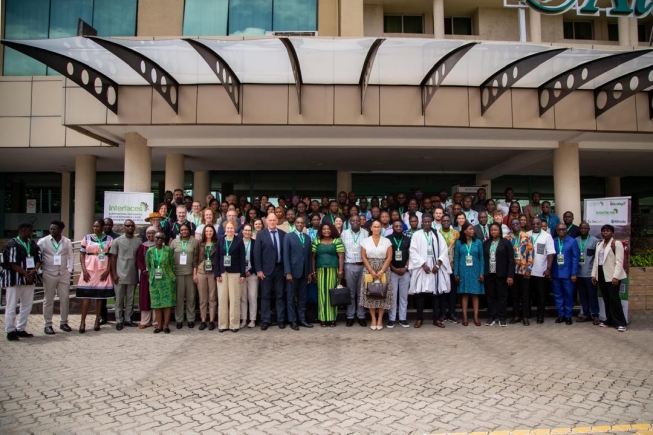The Minister of Environment, Science, Technology and Innovation, Dr Ibrahim Murtala Muhammed, has emphasised the need for science-driven solutions and innovation in combating land degradation and building climate resilience.
Speaking at the INTERFACES Status Seminar in Accra last Tuesday (2 June), Dr Muhammed highlighted the pressing issue of sustainable land and natural resource management, particularly in Sub-Saharan Africa, where soil erosion, erratic rainfall and diminishing soil fertility threaten ecosystems and livelihoods.
The Minister stressed that “science and innovation must drive efforts to address land degradation and promote sustainable development”. He also affirmed the need for scientific research to inform decision-making, implementation and empowerment, rather than remaining confined to academic circles.
Commitment
Dr Muhammed reaffirmed the government’s commitment to strengthening research and development, citing initiatives that support sustainable enterprises and small and medium-sized enterprises (SMEs).
He called on government agencies to enhance communication and collaborative partnerships to unlock private capital and advance the scientific community.
He commended the Forum for Agricultural Research in Africa (FARA) for its continental leadership in agricultural innovation and policy support and assured the government’s commitment to creating an enabling environment for FARA’s work.
“I commend the five projects that have come together here today for their transdisciplinary approaches that bring together science, policy and community action. By integrating local knowledge with advanced tools such as drone technology, and engaging all stakeholders—from traditional authorities to academia—these projects set a benchmark in participatory land governance,” the Minister said.
Seminar
The seminar, funded by the German Institute of Development and Sustainability (IDOS), the Forum for Agricultural Research in Africa (FARA), and the Centre for Development Research (ZEF) at the University of Bonn, was attended by over 120 leading researchers, policymakers and practitioners.
It aimed to foster transdisciplinary exchange on sustainable land management, climate resilience and agricultural innovation in Sub-Saharan Africa.
It highlighted four major research projects—COINS, DecLaRe, Minodu and InfoRange—as well as the INTERFACES initiative, which fosters collaboration between institutions in Germany and several African countries.
The seminar also offered a platform to showcase research outcomes and foster dialogue among diverse stakeholders, from scientists to traditional authorities, youth representatives and development partners.
Participants explored how collaborative knowledge development and innovation can bridge the gap between research and real-world impact, building stronger connections between Africa and Europe.
Government plans
Speaking at the event, the Social Sector Policy Advisor to the Vice President, Dr Miriam R. Iddrisu, said the government had outlined a holistic strategy to enhance agriculture and encourage sustainable land use.
She indicated that, aligning with national development priorities and international climate responsibilities, the government’s efforts focus on empowerment, resilience and inclusive economic growth.
Dr Iddrisu noted that the government was dedicated to making agriculture appealing to young people and women through skills training, financial access and technology-driven opportunities.
“Government is instituting Women in Agriculture, a dedicated initiative aimed at improving women’s access to land, finance and business development opportunities, advancing gender equity and structural inclusion,” she said.
She emphasised that the government had also placed strong emphasis on empowering small-scale and vulnerable farmers through inclusive planning and targeted assistance, such as the “Nkoko Nkitinkiti” poultry project under the Feed Ghana Programme, to boost local poultry production and reduce import dependence, with a focus on supporting smallholder and youth farmers.
INTERFACES Project and leadership
For his part, the Executive Director of FARA, Dr Aggrey Agumya, highlighted the significant progress made by the INTERFACES project in promoting sustainable land management and addressing critical issues related to land degradation, soil health and inclusivity.
Dr Agumya explained that the project, financed by the German Federal Ministry for Research, Technology and Space, aims to connect individual projects focusing on specific aspects of sustainable land management.
He stressed the importance of bringing issues of soil health, land degradation and erosion to the attention of policymakers and the general public.
Highlighting Ghana-specific initiatives, Dr Agumya said, “The project is mainly based in Ghana’s Northern Region, focusing on outreach, knowledge management and capacity development.”
“The project addresses issues of soil fertility management, inclusivity and land tenure, particularly regarding women’s access to land. It also focuses on youth engagement and gender issues related to land management,” he said.
Dr Agumya added that the project’s engagement with traditional leadership was a novel aspect, particularly in the context of land governance. He said the project also partners with local institutions, universities and traditional authorities, recognising the crucial role traditional leaders play in land management.

